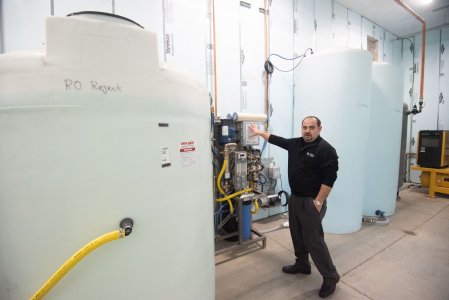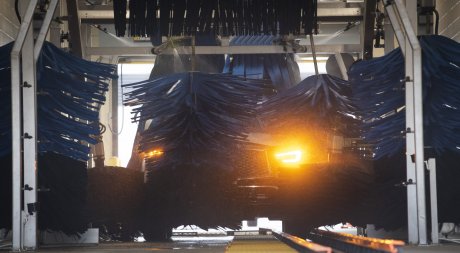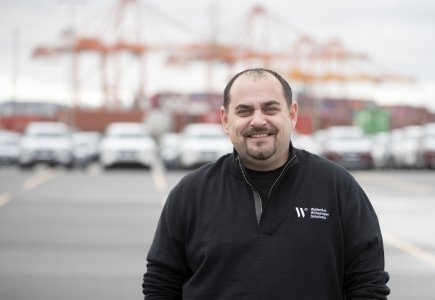Two years after the Taylor Way Auto Facility opened, its stormwater system works like a charm.
To the casual observer, the Port of Tacoma’s Taylor Way Auto Facility looks like little more than a vast parking lot used to process imported vehicles on the Tacoma Tideflats. But, to those familiar with the site’s history and what happens under the asphalt every time it rains, the facility is an unassuming symbol of the Port’s and tenant Wallenius Wilhelmsen Solutions’ (WW Solutions) commitment to protecting the health of our waterways.
“It is a huge home run for us and for WW Solutions,” said Anita Fichthorn, the Port’s water quality project manager.
Dion Surface, general manager for the WW Solutions facility, says, “We consider ourselves stewards of the land.” He points to the facility’s water-recirculating car wash system and aggressive recycling program as examples of this commitment. But it’s what you can’t see that’s most impressive.


The 96-acre facility has an innovative stormwater treatment system that maximizes the space and keeps pollutants from washing into the Blair Waterway. Instead of pumps and a traditional treatment pond that would have left a large portion of the facility unusable, the system concept designed by Fichthorn uses 30 shallow vaults filled with sand, biochar, oyster shells and other material. Pollutants and heavy metals (such as copper and zinc) start filtering from stormwater as soon as it hits the ground, she said.
Investing in projects like this helps protect the health and well-being of nearby residents, while also protecting the natural biodiversity of the area.
Jonathan Spampinato, Wallenius Wilhelmsen’s senior manager of global sustainability
WW Solutions, which has called in the Puget Sound region since 1992, signed a 30-year lease in 2018 and took over the site’s Stormwater Pollution Prevention Plan when the facility opened that December.
“For our own long-term sustainability, it’s crucial we have healthy, sustainable port communities as partners,” said Jonathan Spampinato, Wallenius Wilhelmsen’s senior manager of global sustainability. “Investing in projects like this helps protect the health and well-being of nearby residents, while also protecting the natural biodiversity of the area.”
The company hires stormwater management specialists “so nothing gets by us” and reports monthly to the Department of Ecology. “Washington state takes this seriously and so do we,” Surface said. WW Solutions uses sweepers to clean the lot of debris and potential pollutants to maximize the effectiveness of the stormwater system.

So far, Surface says, the system “has been superb to say the least.” The same can be said for operations at the facility.
The facility is large enough to process 100,000 vehicles, most of which are transported by rail to the Midwest, each year. Through a partnership with the ports of Tacoma and Seattle, The Northwest Seaport Alliance manages the cargo-handling operations at the site.
For Surface and Fichthorn, the ecologically friendly site is also a point of pride because of its history. The location was home to the former Kaiser Aluminum Corporation smelter, which polluted the soil for more than half a century.
Kaiser closed the smelter in 2000. The Port of Tacoma bought the site in 2003 and spent years demolishing structures and removing contamination. Polluted soil was capped so it will not leach into the waterway.
“The Port spent a lot of years and money so this land could be used and be environmentally friendly,” Surface said.
Fichthorn thinks success stories like this could eventually change the way people think of Ports.
“I think, historically speaking, ports have a reputation for being dirty,” Fichthorn said. “But they are so much cleaner than they used to be. There is a lot of innovative science and a lot of hard work going into improving and taking care of our waterways.”

